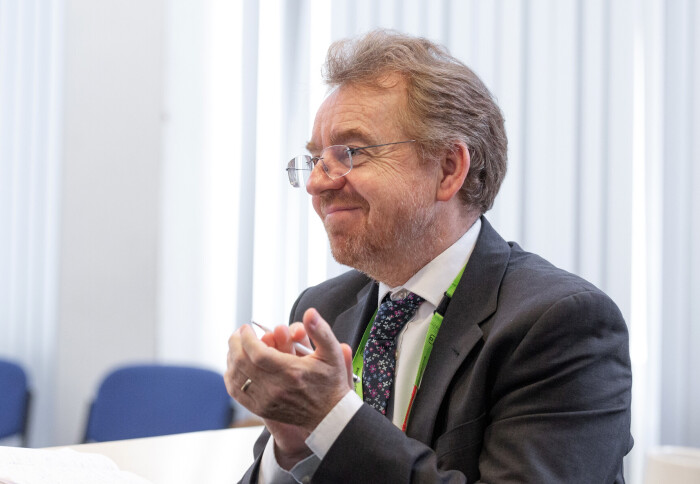Imperial College Medal Winner - Professor Stephen Curry
by Emily Govan

Professor Stephen Curry was recently awarded the Imperial College Medal for outstanding contribution to the life and work of the university.
He is the College Consul for the Faculty of Natural Sciences and Cross College Organisations and is known well internationally for his contributions to science, science policy, and equality, diversity and inclusion.
We caught up with Professor Curry to talk to him about his award, his 30-year long sterling career at Imperial and his wonderful contributions to the university.
Stephen, you have had a fantastic career at Imperial and actually began life here as a student, can you tell us a little about that and your career path?
I have been at Imperial for a very long time in all. I started as an undergraduate in Physics way back in 1982. Though I tried to leave for my PhD, the most appealing project I was offered was to study general anaesthetic mechanisms with Professor Nick Franks so I stayed, making the move from pure physics to more biochemical pursuits. I developed a real love for experimental work during that time. I enjoyed the freedom to investigate – Nick is not a micro-manager – and learned a lot, especially about crystallography, from friends and colleagues in the biophysics section.
What scientific discovery during your career do you feel most proud of?
Hard to pick one out but my postdoctoral work showing that the 135S poliovirus particle was a critical intermediate in the poliovirus infection pathway, rather than a dead-end product was an early favourite. But I am also proud of the structural work we did to map the binding sites of fatty acids and drugs on human serum albumin and our investigations of RNA viral replication mechanisms which probed the structures of crucial host cell and viral proteins. I was particularly glad to be able to show our work on the 3C protease from foot-and-mouth disease to David Blow, (the former head of Biophysics), which turned out to have intriguing similarities with the first ever protease structure, Chymotrypsin, which he had published in the mid-sixties.
 You have championed all sorts of important cultural issues during your time here, including equality and diversity. Can you tell us a bit about why this area is so important and the changes that you helped make.
You have championed all sorts of important cultural issues during your time here, including equality and diversity. Can you tell us a bit about why this area is so important and the changes that you helped make.
When I started my blog in 2008, it got me interested in many different aspects of the business and culture of science. That helped me to get involved in debates, campaigns and working groups on a range of topics such as open access publishing, research assessment and the case for public investment in R&D. It also got me a spot on the Guardian for about six years. If you believe in the power and purpose of research, you want it to be done well, but there are many aspects of how we do things these days that are sub-optimal. EDI is a big part of that because if you really want to attract the bright and best people to research, you have to be able to search in the widest possible pools of talent. For too long universities have laboured with the biases and inequalities that afflict our society. As progressive institutions, I think we have a duty to be in the vanguard of opening up opportunity and creating work environments where people from all backgrounds can thrive.
You have also contributed so much to the development of teaching, including expanding the teaching fellow cohort and disseminating good practice across Life Sciences. Can you tell us what teaching means to you?
Being DUGS was one of the most difficult jobs I had during my time at Imperial, largely because I took on the role immediately after a rather painful restructuring. While most academics might prefer to spend their time on their research, as a university, we absolutely have to deliver on our teaching mission. Managing workloads remains a perennial issue but as DUGS I saw that the vast majority of our staff were deeply committed to our students. I saw that again this year because as consul I sit in on the academic promotions interviews for FONS and was so impressed by the invention and care that people bring to their teaching and supporting students. Happy students who go on to have successful careers are one of our most important outputs.
 You were recently honoured with the President’s Medal, at Commemoration Day. Congratulations! Can you tell us a bit about what the medal means to you?
You were recently honoured with the President’s Medal, at Commemoration Day. Congratulations! Can you tell us a bit about what the medal means to you?
Receiving the medal, especially because it arose from a nomination from colleagues in the department, was a very nice way to round out my years at Imperial. I think I have been a team player all along but also someone who was not afraid to take on responsibility for leading change on teaching and EDI, for example, but who was also willing to go the extra mile in campaigning for what I believe it – research funding as part of the Science is Vital Team and reform of research assessment as Chair of DORA for six years.
We wish you the very best for the future. To sign off, can you tell us an interesting fact about yourself that colleagues might not be aware of!
OK, that’s a hard one. I make a very good raspberry pavlova, recently improved by making it with pistachio meringue.
Article text (excluding photos or graphics) © Imperial College London.
Photos and graphics subject to third party copyright used with permission or © Imperial College London.
Reporter
Emily Govan
Department of Life Sciences